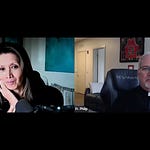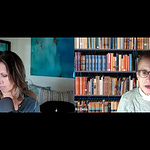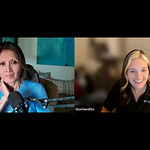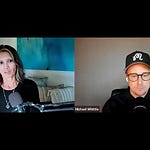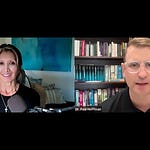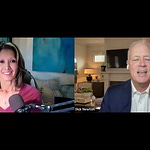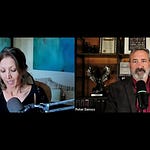From 2017-2023, I hosted healthtech events with my co-host Dr. Archana Dubey called Invent Health. Every year, at least one event focused on mental health and specifically on innovations around cognitive behavioral therapy (CBT) - evidenced-based talk therapy to improve anxiety or depression. The goal of CBT is to get patients to consider new ways of approaching life and to be resilient in the face of despair. Similarly, religion offers a sense of purpose and hope.
Yet sadly encouraging patients to consider God isn’t exactly a treatment protocol. The reason is because CBT is, so they say, a scientifically “evidence-based” solution to treat mental health while religion is anything but. In fact, it is a mass delusion, according Sigmund Freud, the founder of psychoanalysis, whose perspective somehow became orthodoxy, shaping decades of bad, if not perilous, science.
During one event in 2019, religion was a big part of the discussion. You can watch and read an essay we wrote titled: “Religion is good for mental health, so can tech replicate the positive aspects?” One speaker, Sonia Arrison, who wrote about death and religion in a chapter of her book 100 Plus, said one scholar she spoke with referred to religion as an all-purpose technology and the first self-help discipline. In other words, religion works. Yet in a room full of scientists and technologists, the idea that we’d spend a few minutes, let alone an hour, talking about cultural viruses (as Richard Dawkins describes religion), was a waste of time for many, if not a giant step backward in our thinking. After surveying our audience, as we always did post event, the response to the conversation on religion was somewhat positive (thankfully) but largely critical, especially from technologists seeking psychological, psychiatric or technological solutions to the problems of our mind. Religion was ancient voodoo to them.
This mindset persists, notwithstanding the multiple studies showing that people who are religious live many years longer than those who don’t align with a religion.
All this said, perhaps, the tides are turning. Even in Silicon Valley, there’s been a Christian revival during the last several years. Relatively recent studies show prayer shouldn’t be discounted as a factor in someone’s healing process. There’s also been a plethora of positive articles titled: Science says: Religion is good for your health or this “The role religion plays in mental health.”
And doctors are speaking loudly in support of prayer to heal the “whole” person - mind and body.
Take psychiatrist and bioethicist Dr. Robert Klitzman, who isn’t exactly a devout religious person, but someone who’s witnessed the role of faith and its miraculous affect on health. Robert is the author of “Doctor will you pray for me,” which chronicles stories of dozens of patients whose mental and physical states improved after seeing chaplains and of doctors who feel inadequate or uncomfortable in addressing their patient’s thirst for spirituality and God.
One of the reasons doctors lack a response to topics of faith, besides the influence of secular humanism, is because the medical schools and medical organizations keep science and religion separated. About 60% of medical school deans don’t believe there is a need for spirituality and health curricula in their schools.
This is something Robert hopes to change with his book. After all, even he became a believer in a higher being after being a long-time skeptic though he hasn’t taken that big leap of faith into any organized religion. Yet one can argue that science requires a big leap of faith as well. This is particularly because many scientists have become religiously dogmatic about their views, that their science justifies their political positions. For instance, during Covid the CDC under the Biden administration issued school opening guidance that was edited by The American Federation of Teachers, according to the White House. For more on ideological rigging in the medical field, watch my conversation with Dr. James Nuzzo.
Robert and I discuss the sad state of affairs of fraudulent medical studies around the world that’s caused people to disregard the “expert” class, and their so-called evidence-based science and whether Trump’s Executive Order “Restoring the Gold Standard” to clean up scientific discovery will help at all.
Robert is also the author of Designing Babies: How technology is changing the way we create children. At the end, we discuss the ethics around birthing the ideal child.
You can read more about Robert and his work here: https://www.klitzman.com
Interview coverage:
2:00 - Why the book was written.
3:30 - How Robert realized that religion can do something that doctors can’t do.
6:50 - Studies show most patients want to talk about spiritual, existential and religious issues but most doctors avoid the topic.
9:29 - People thirst for something spiritual.
12:55 - Most effective treatment for alcoholism is AA, part of that program includes religion.
15:07 - Why do scientists have so much animus against religion?
18:25 - The ongoing tension between Jerusalem and Athens; and the problem of measuring religious impact.
19:46 - The absence of evidence is not the evidence of absence.
21:00 - From skeptic to believing in a higher being.
23:00 - The importance chaplains in hospitals. They’re the only ones doing something resembling psychotherapy in hospitals while psychiatrists are mostly called in to give medications.
27:00 - Most medical schools are skeptical of religion.
31:00 - Science is increasingly taking agency away from people in the 20th and 21st centuries. What about RFK’s healing farms?
35:45 - The problem and proliferation of fraudulent science papers around the world. James Nuzzo’s work in fraudulent academic papers.
39:00 - Trump’s executive order “Restoring the Gold Standard” in research and whether it can help bring back trust in science.
45:00 - The problem and misinformation around selecting embryos to birth the perfect kid.



